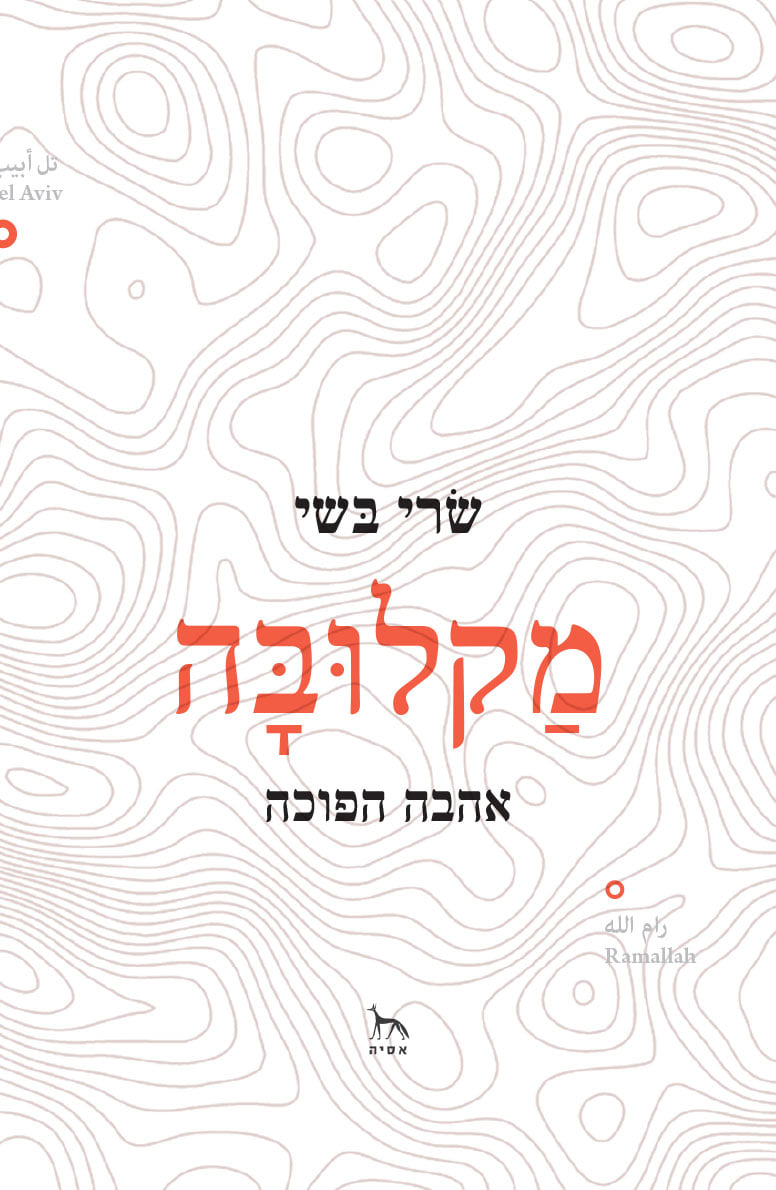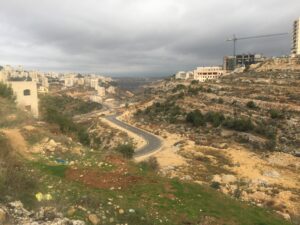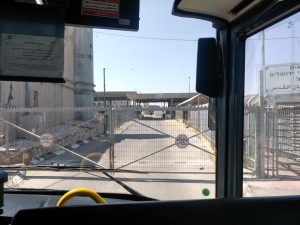The Israeli Minister of Culture gave me a Hebrew literature prize. I’m grateful. And trying to reclaim Hebrew from those who use it to oppress.
Hebrew is not the private domain of the Israeli military or state
A week had passed since I had brought our daughter Forat home from the hospital where she was born. Friends visited us in our apartment in the Ramallah area. They admired Forat as she slept in the living room, and we all drank coffee until she awoke, crying. I picked her up and told her, in Hebrew, that I would take her to the bedroom to breastfeed. Our guests froze in the middle of their conversation. There was a brief silence, and then they laughed, breaking the tension.
They had never heard the Hebrew language spoken lovingly.
I didn’t make a conscious decision to speak Hebrew to Forat. She was born early, before we had a chance to make a lot of decisions. She and I spent the first weeks of her life together in the neonatal intensive care unit of Tel Aviv’s Ichilov Hospital, while my partner, Osama, was barred from entering Israel. Within the hospital, surrounded by devoted doctors and nurses, it felt natural to speak to her in Hebrew, and I continued doing so after she came home.
As Forat grew older, she began to answer me in Hebrew, and not very quietly. It happened for the first time as we were about to leave a neighborhood market in the Ramallah area. Forat, then three years old, began to scream: “Ima! You didn’t buy me a lollipop!” I felt like crawling into a hole. I had to justify our use of Hebrew, in a place where the language is perceived as threatening, as are those who speak it. I found ways to explain that I’m an Israeli Jew, married to a Palestinian man, and to offer reassurances that I’m not a settler but rather a guest in a society that my country is occupying.
Sometimes, when people ask, “Where are you from?” I answer: “From among your cousins.” That response is a reference to the religious belief that Muslims descend from Ismail or Ishmael, while Jews descend from his brother Isaac. When Osama heard me, he asked me why I choose that answer.
“Do you remember how you felt, after your divorce, when people asked you how Nisreen is doing, and you had to explain that you had divorced?” I asked him in reply. Osama flushed and nodded.
“That’s how it is for me,” I said. “I’m not ashamed of who I am, but I don’t proudly announce my identity here.”
I’m trying not to give up Hebrew, at least until we reach the day – if we reach it – when Forat asks me to stop speaking it in public. I’m trying to resist the appropriation of the Hebrew language by the Israeli authorities. They have ingrained Hebrew in Palestinian consciousness as a language of violence and occupation, used to shout at people at checkpoints or to humiliate them in border crossings and military coordination offices. But Hebrew is not the private property of the military, the Zionist movement or the State of Israel. It is rooted deep in Jewish and Hebrew heritage, a heritage that did not begin with the establishment of the State of Israel or the Zionist movement. Hebrew belongs to my children and me, too.
I won a government prize for Hebrew literature
This week, I won the “new authors” prize from the Israeli Minister of Culture for the book I wrote, Maqluba: Upside Down Love (Hebrew, Asia Publishing 2021). I felt a mix of shock, pride, excitement and also confusion. “Maqluba” is a love story in two voices, mine and Osama’s. It tells of a crazy, impossible, insatiable love, struggling to find its place in the shadow of the occupation. The book is also critical of basic principles of the Israeli regime. While a panel of independent literary experts determines who gets the Ministry of Culture prizes, Israeli ministers have not always respected the independence of independent prize committees.
I took the fact that the government awarded me the prize – despite our differences of opinion – as a welcome sign that there are still spaces within Israeli society where people support and celebrate independent Hebrew culture. I am grateful.
I want to reclaim the Hebrew language as belonging to me, too, and to other Hebrew-speakers who oppose its appropriation as a tool of oppression. I want to imagine a world in which we cultivate Hebrew, without cultivating the domination of those who speak it over another people. I want to find a way to continue to speak Hebrew with my Palestinian-Israeli children.
This post was also published on haaretz.com on February 7, 2022:
https://www.haaretz.com/israel-news/.premium-why-i-spoke-hebrew-to-my-daughter-in-our-palestinian-neighborhood-1.10596921




מעניין את ממש מכירה בזה שהמציאות מורכבת כשאת באה לתאר את המציאות הפלסטינית ומכחישה את המורכבות שלה כשאת מתארת את המציאות היהודית ישראלית פה.
חבל כי הייתה יכולה להיות לך הזדמנות פשוט לתת מקום למורכבות האנושית שיש לנו פה ובמקום זה בחרת לפשט ולהפוך אותנו (אם תרצי זה כולל אותך ואם לא תרצי אז לא) הישראלים לשטן הגדול למרות שבעצם מדובר במציאות מורכבת שחלק מהסיפור שלה הוא עם בפוסט-טראומה אחרי ניסיון השמדה ורצח מנסה להתקיים כשלא מעט גורמים בסביבתו טוענים שהרצון שלהם זה שהוא לא יתקיים (ולא רק לא הייצוג המדיני שלו) חבל אבל אני מבין שלהחזיק בנפש גם את המורכבות היהודית-ישראלית וגם את הפלסטינית יכול להיות שגדול על נפש אנושית אחת
גל חביבה,
שוב פעם הסיפור על הקוזאק הנגזל…. המציאות היא לא רק מורכבת – היא מסובכת, מסובכת מאוד!
כשאת מזכירה את סבלות העם היהודי לדורותיו ראוי היה לך להרהר גם ב״אל תעשה לחברך וגו׳…״
ראוי לאדם אינטלגנטי, ואני מניח שאת כזו, שתהיה לו היכולת לשים עצמו במקום זולתו כדי להנסות להבין את שורשי סבלו. גם מעט חמלה לא תזיק.
אדם חכם אמר שמי שלא קורא את ספרי ההיסטוריה יאלץ, בדיעבד, לחוות אותה שנית… ובמה הדברים אמורים? – תמצאי לי מקרה אחד בהיסטוריה בו עם כובש שרד לאורך ימים – כולם עברו מן העולם! תתחילי לקרוא ויפה שעה אחת קודם.
תודה, גל.
“guest in a society that my country is occupying”.
I find this sentence rather ironic. Which and where is your country Umm Forat?
The so called ‘Israel’ is a colonial enterprise built on parts of the land of Palestine, stolen by the zionist movement.
Unless you came from another country – like most of the zionist squatters – which makes that to be your country, or alternatively, if your extended family lived on the land of Palestine for the last few centuries then you are an indigenous to the land, a Palestinian.
‘Israel’ is an abomination, an unnatural phenomena that should not had happened and it should not last.
I don’t hold bitter feelings towards you, on the contrary I admire your stance against the occupation, you actions for justice and enjoy reading your posts, but that occupation isn’t limited to only parts of Palestine.
Palestine, all of Palestine , is homeland to its original and historic inhabitants Jews, Christians, Muslims and any other faith or none.
Thank you, Abraham.
Congratulations!
Thank you, Jane!
מבסוט שזכיית בפרס . בעולם המטורף שבו אנו חיים, גם זו נקודת אור.
תודה, עמירם!
So Hebrew is kind of like German after the war. For many people, a language of yelling, commands, abuse, and injury.
Thank you, Elizabeth.
Mr. Deeb’s comments fail to recognize that migrations of peoples are common in human history. Displacement because of war and oppression has been a frequent motivation for such moves. Clashes between Indigenous and invader groups are often the result, and, unfortunately, the latter often use their greater power to oppress the earlier residents. Muslims did this to Christians and Jews in Palestine and elsewhere over a millennium ago, and Jews have done this to Palestinians in the last century. Europeans did this to natives in America and Oceana. I am not arguing that this is morally right. But I think the closest to a fair resolution would be to find space and equal rights for all who seek to live in the land. The survivors of Nazism and oppression in other lands (including where Muslims rule) needed the haven that Israel has provided. Given that history, the Jews ruling Israel should avoid producing conditions that oppress Palestinians. On the other hand, Palestinians must accept that space will need to be shared. And they rightfully should claim compensation for displacement costs.
Thank you, Richard.
שרי יקרה,
ברכות חמות לקבלת הפרס!
ספרך הוא אספקלריית הכיבוש שמשתקפת דרך סיפור האהבה המשוגעת שלכם, בכך ייחודו!
כל טוב
יהודה
תודה רבה, יהודה!
השורשים היהודים אינם שלך , כרתת אותם עקב בחירתך וגם אינם שייכים לילדיך
ברכות על הזכיה בפרס. היה ראוי לציין את שם השר שהעניק לך אותו. מאחל לך המשך כתיבה פורייה.
הי משה, תודה רבה, ואתה צודק במאה אחוז. מגיע לשר חילי טרופר שיציינו את שמו.
Looking forward to your book in English.
Thank you, Tom!
Thank you. I always feel renewed after I read one of your posts. Renewed, refreshed, ennobled just by the contact with your way of thinking. I wish you and your family all the best. איל ווינטש אייך אלעמען א גוטן תמיד!
Thank you, Shimke!
הגיע הזמן קצת שפיות בעולם שכל אחד חושב שהוא ורק דעתו היא הצודקת. די לבלבול. בוודאי איני קוראת את “ישראל היום” השלוה שלי חשובה לי בעשייה.
תודה, רותי.
I am always excited, Sari, when I spot a story from you in the English version of Ha’aretz which I get through my local public library. I read and each time my eyes well up knowing why in my heart, but not being able to put it in words. It’s a whole world of feelings, good feelings. I’d love being a neighbor of yours and your family’s.
Thank you, Gunther! All the Haaretz posts are also on this web site, if you like.
פעם ראשונה שאני נכנס לבלוג שלך. האמת? את הסיפור האישי שלך אני מבין לגמרי ומוצא מקום בליבי להזדהות אנושית ברמה הכי פשוטה של המילה. אבל זה ברור שיש משהו שאני מחמיץ בגדול. אולי אפילו את עומק מה שאת אומרת. לא ברור לי ההיגד שהשפה נוכסה על ידי הרשויות בישראל. למה נוכסה? האם כאשר יהודים בישראל מדברים בעברית הם משתמשים בשפה לא שלהם? האם יש תביעת תמלוגים על שימוש בשפה העברית כאשר היא מדוברת על ידי גויים או יהודים לא ציוניים או אנטי ציוניים? האם השפה בה חיילים ופקידים של המדינה מדברים עם ערבית בשטחים היא זן אחר של השפה? למה את בדיוק מתכוונת?
תודה, עמית. על השיתוף והתובנות.
באמת נפלא שזכית בפרס.אני מסיכמה איתך: ובוודאי שהעברית הרבה יותר מהכיבוש. היא אפילו יותר מהציונות, על אף תרומתה של האחרונה לתחיית העברית. ממש כשם הגרמנית היא יותר משפת המחנות והנאציזם, ממש כשם שהיהדות היא יותר מדת של מתנחלים. כן, אנחנו צריכות לדבר אותה כפי שאנחנו רוצות, לעצב אותה בדמותנו.
אמן, אמן!
Have always appreciated your boldness & fire & willingness to suffer. Basically, this is true womanhood, since we do all this without consciousness. Love you stepping out ahead of all of us to speak so that we can learn from each other. I want to follow your lead. Thank you for going ahead.
The key is to speak. Finding a voice is the gift. I await my time. Enjoy sharing your space in the meanwhile. I celebrate our generous heart!
מי ייתן שהאנושות כולנו תתעורר מהבורות
מי ייתן והאנושות כולה תנהג אך ורק בחמלה
האחד כלפי האחר, ולהיפך.
מי ייתן וכול הגבולות, כול החומות, כול הגדרות בכול העולמות
יתמוססו ברגע הזה.. כאן ועכשיו..
מי יתן שכול היצורים יוכלו להסתבוב בכול מקום בשלווה ובאהבה
בלי פחד, ומבלי כול צורך לנכס לעצמם דבר.
מי ייתן ועם אל עם, או אדם אל אדם, לא יישא חרב.
מי ייתן ונדע כולנו שחרור מלא מכול סבל והארה מלאה.